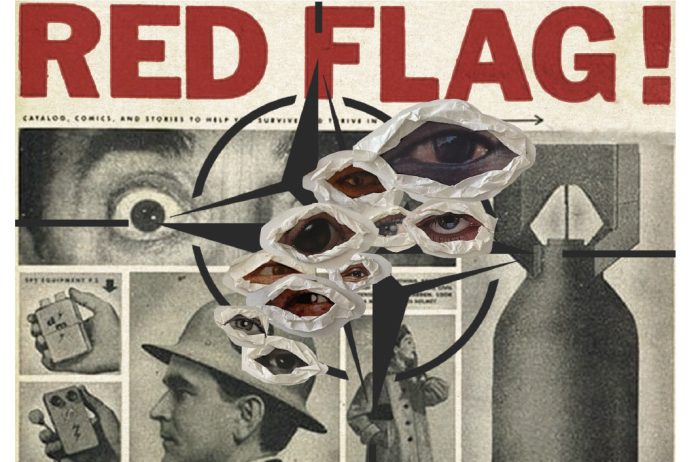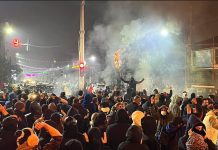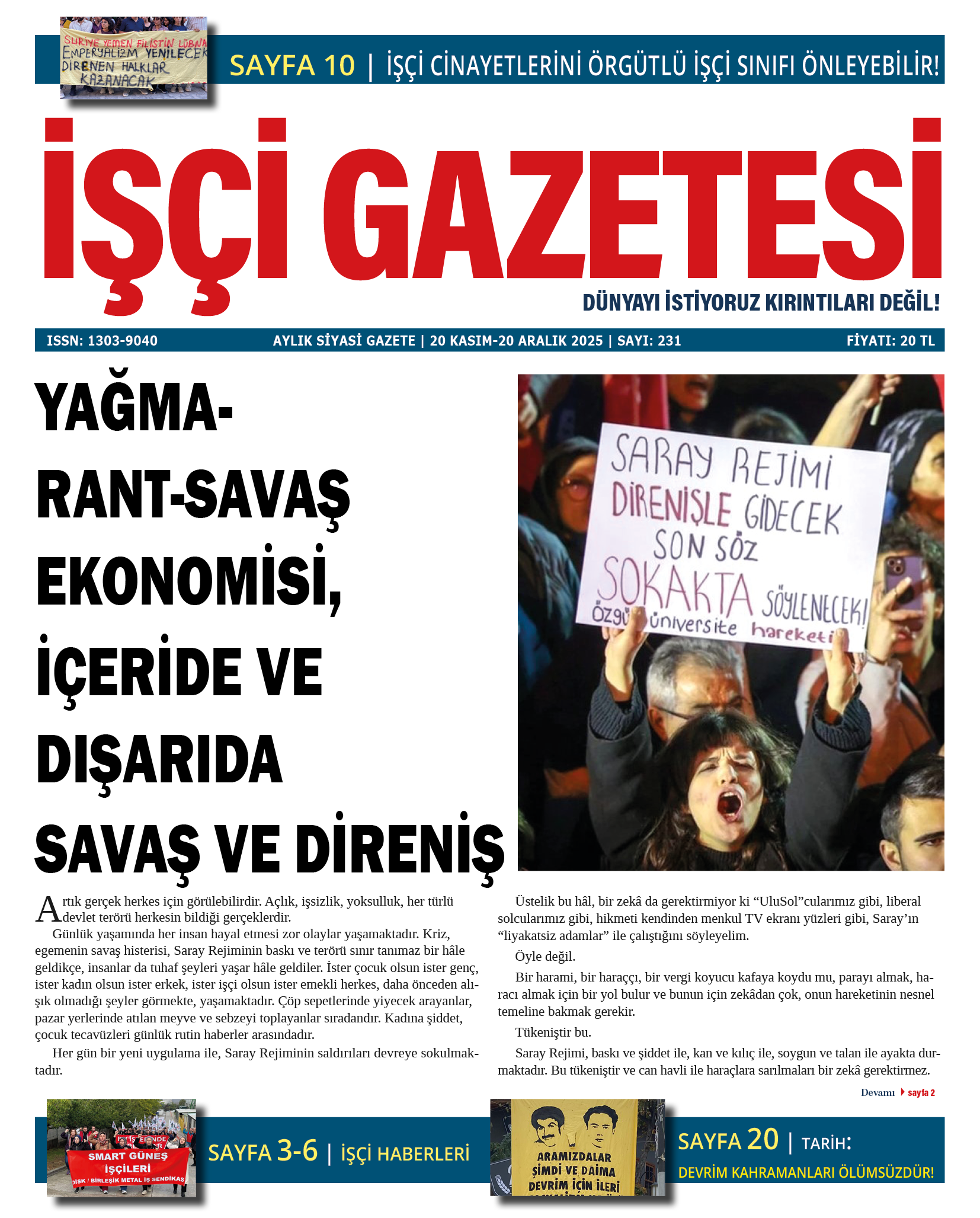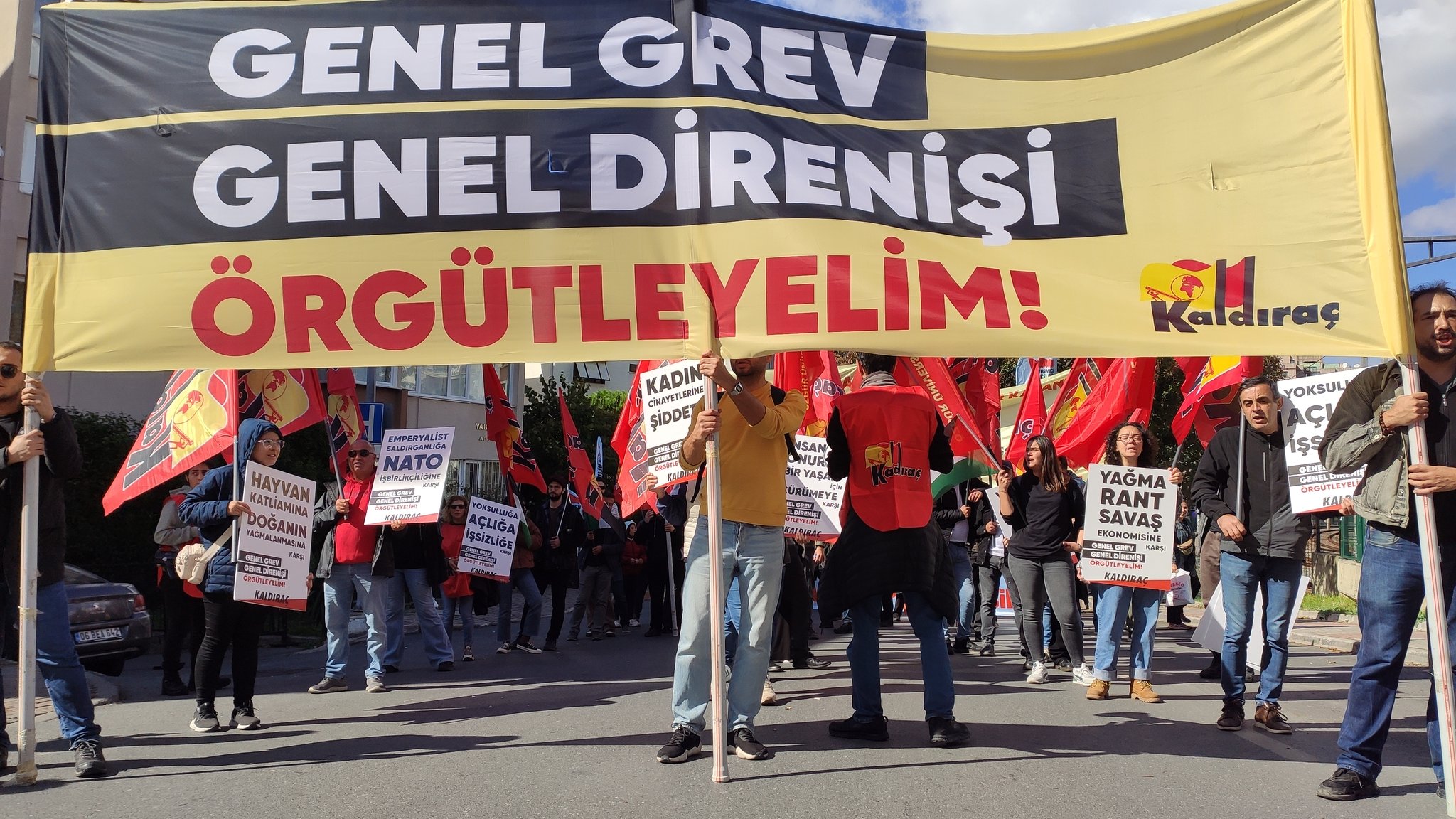Deniz Adalı
July 2024 – Kaldıraç Issue 276
We, as the Kaldıraç Movement, have been drawing attention for a long time to the war of division, the war of the 5 imperialist powers to redivide the world. This, of course, also means a world war. For this reason, many of our friends, no doubt they are still our friends, have more than once warned us, “Where is the war, you are exaggerating”. Of course, there are two sides to the issue; firstly, it is a great mistake to assume there is no war when you do not see it at your own home. Secondly, it would be a delusion to suppose that war, in the 21st century or in any other period of time, will follow a straight path.
Today, as of June 2024, the reality of war is on the mind of almost every sensible person (not only revolutionaries).
Therefore, for those who have focused their attention on the future, it may be of interest to analyse the current situation once again. For there is much to discuss.
The dismemberment of Yugoslavia in the centre of Europe, the US invasion of Afghanistan, followed by the invasion of Iraq, and then the dismantling of Libya can be regarded as the previous phase of the war, so to speak.
Because with the Syrian war, which would be 2011, the situation had changed. Russia had entered the field and the war now seemed to follow a different course.
The developments grounding the war of division could be analyzed from two aspects. Firstly, the US hegemony began to unravel. This also means, from the other side of the story, that other imperialist Western powers, especially the other four imperialist powers, began to challenge the US hegemony. Germany and Japan began to force the US economy on the path of economic development, without their military industries leading. The crisis of 1971 and the subsequent establishment of the petro-dollar system did not in fact stop the reaction of the G7 powers to the US’s unrequited printing of dollars and its consequences. Germany and Japan in particular, as the defeated powers of the Second World War, had achieved rapid economic development, even though they were militarily under control. This was putting a strain on the US economy. This indicated that the US hegemony was unravelling from within. Even though organizations such as the IMF, the World Bank, NATO, etc. were still effective in maintaining US control, this was the situation. At the beginning of 1990, the second factor, the dissolution of the USSR, took place. This situation was presented as a victory in one respect for the anti-communist world imperialist system organization headed by the USA, but at the same time it played an accelerating role in the war of partition between the imperialists. The example of Yugoslavia illustrates precisely this. All the G7 countries got their fair share of the pie. The “people’s democracies” of Eastern Europe were shared as part of the “free capitalist world”. All their will were stripped from them. But since this loss of will was treated as submission to the will of NATO, it was not discussed much. Until the Ukraine crisis.
The Syrian war, followed by the transformation of Ukraine into a US puppet by a coup d’état in 2014, changed the path of the war’s development. In the Syrian arena, the imperialist powers, mostly on behalf of the USA, deployed hitmen. This has also been called “proxy wars”. Syria also signified the opening of the Pandora’s box. Syria was followed by Ukraine, after Russia’s entry into the field. And the link between these two is much stronger than one might think.
Meanwhile, two noteworthy developments should not be forgotten.
The first, taking 2004 as a starting point, is that China’s role in the world market has begun to change. China was the “factory of the world”. Had it still remained the world’s factory, the Western imperialist system and global capital would have seen no problem about it. But in the early 2000s, let us say 2004, China decided to join the market with its own brands.
In order to understand the issue, a reminder would be appropriate. The Boeing Company had shifted a large part of its production to China. In the mid-1990s, a CIA official wrote a letter to Boeing’s CEO about the security threats posed by Boeing’s production shift to China. The letter drew attention to the danger of China copying Boeing. In his reply, the CEO mocked the CIA official and said that this point had already been passed (see the study “The 21st Century and Capitalist-Imperialism”). In fact, China could have remained, for example, Apple’s main production base, but China tried to introduce Huawei or other mobile phones or its own technology in other fields. And this situation made Western capital and international monopolies very uncomfortable. In other words, the issue was not that China and other Far Asian countries had become the factory of the world. On the contrary, the problem was China entering the market.
And in addition, in 2008, a major economic crisis emerged. At first, the crisis was labelled as a “financial crisis”. But the issue was far deeper. And after a few years, the situation began to be understood more clearly.
These two developments must be added to the war of division. Because in practice they have been added. Without them, the seriousness and dimensions of the situation cannot be understood.
Thus, the wars in Syria and Ukraine must be analyzed taking into account these two developments.
The US has restructured its war strategy. It would not be wrong to say that it coincides with the Obama era. However, it is very difficult to periodise such developments according to neither a precise date nor individuals. But at some point, the US reviewed the situation and started to find a new path.
This new way was to unite the other imperialist powers by declaring Russia and China as enemies. This way, it would have persuaded the imperialist powers, which were at war among themselves, to reassert their hegemony.
Previously, the US had put forward radical Islamic sectors, which it had developed as part of its policy of encircling the Soviets, as a “common enemy”. The common enemy was an important tool for uniting the West and bringing it under the US umbrella. But how Islamic radicalism was born and developed was ultimately not a secret for the other imperialist powers either.
Whereas Russia and China could have been more effective as a common enemy. The Syrian war was not enough for this.
This is how Ukraine was staged.
The Ukrainian regime had become such a puppet of the United States that it turned its own territory into a battlefield for no good reason. And then we realized that none of the Eastern European countries, or the majority of them, had the will for an independent state.
On the one hand, the United States had no difficulty in assuring its Western partners that they themselves were the only way to stop China’s economic rise. On the other hand, the play being staged in Ukraine was a great opportunity for the control, almost a kind of occupation, of the whole of Europe. Europe had now come under the will of the United States. This was the clear gain for the USA in the first days of the war in Ukraine. And it was assumed that this would be of great help to the US economy in overcoming the crisis.
Roughly speaking, the masters of the world, or at least the Western imperialist powers, who see themselves as such, have come together with the intention of (a) first tearing China and Russia apart and (b) colonising both of them. The German Chancellor, referring to Europe, said that “we must deal with Russia so that the US can handle China”.
Now it is possible to discuss where we are in this war.
1
In 2003, China was a country that did not have a single company in the list of the world’s 500 largest companies. Today, it is the country with the highest number of companies among the world’s 500 largest companies.
China has surpassed the USA and other Western powers technologically in many, if not all, fields. It is the largest country in the world in terms of purchasing power parity.
In spite of all the US plays such as sanctions etc., China still continues to grow.
In the meantime, China, with its “Belt and Road” initiative, is making moves that will overcome many Western measures. The wars in Ukraine, Syria, etc. are actually aimed to prevent this “Belt and Road” initiative. Although this is not the main point, it is also part of it.
Today, China is by far the leader in the electric vehicle market and its own brands are among the pioneers of the sector.
Despite all threats, the “friendship” between China and Russia remains intact. For this reason, the US pursues an aggressive policy against China through Taiwan and is further activating it. For this purpose, it is trying to restrain China through countries such as the Philippines, South Korea and Australia.
At the end of May, the US Minister of Defence, meeting with the Chinese Minister of Defence, trampled on diplomatic style, unmasked himself and declared that they could not agree and that “the only way out is war”. Of course, the US can also make statements suggesting that they are committed to the policy of “one China”. But their war plans are more recent and obvious.
To summarise, despite all obstacles, China’s influence in the world market is increasing and it is technologically far ahead of the Western countries. In this case, the incitement to war by the USA in order to stop China will continue to escalate in the coming period.
2
Russia has been drawn into a difficult conflict in Ukraine. In this way, the US has made great progress in preventing any kind of economic, political, cultural, etc. co-operation between Russia and Europe. Nevertheless, the war, which Russia calls a “special military operation”, is gradually becoming a dead end for the West.
Russia has not, as one might think, been isolated. Certainly, developing common policies with China on this issue is an important aspect. But at the same time, it has developed its relations, if not in every country of the world, then in every country outside the NATO states. Russia could not be isolated. US and NATO policies have failed. At least such is the situation today. Moreover, relations with Russia are becoming more vibrant in many countries today.
In 2024, the St. Petersburg (Leningrad) Forum became a major center of attention. To the extent that if this is what being “isolated” is, it is hard to know what is not.
Russia has put the “Northern Sea Route” up for discussion at this forum. Accordingly, it seems that an alternative route to the Suez Canal has emerged and this route is said to shorten the journey to the whole of Latin America by at least 2 weeks. And a period of 5 years is envisaged for the launching of the road.
Militarily, the US and the West want to intensify the war. In fact, Ukraine’s shift of the war towards the civilian population remains a challenge for Russia. One of the challenges for the special military operation in Ukraine is Russia’s desire not to harm the Ukrainian population, which it sees as part of its own people or as a brother or sister, and perhaps to some extent not to destroy the infrastructure. This prolongs the war. But at the same time, it is also a sign that efforts are being made to prevent a genocide such as the one Israel is committing in Gaza. The prolongation of the war was initially considered “favourable” for the West. Today, however, the prolongation of the war has become a challenge for the West. Perhaps this is also one of Russia’s wishes. The “experts” who, in the early days of the war, claimed that Russia was unable to defeat Ukraine, speak differently nowadays.
Whereas in Ukraine, there is a war between Russia and NATO.
According to the World Bank reports, the Russian economy has become the 4th largest in the world in terms of purchasing power parity, surpassing Germany and Japan. Surely, this is not a major fact by itself, but it is proof that the West’s unreasonable sanctions are not so effective after all.
In the meantime, Russia has also initiated a new process of nationalization, the so-called “deprivatization”. This does not, of course, imply the establishment of a socialist economy. No, it only proves that the privatization processes have come to an end and that a reverse tendency has become an objective imperative. Putin explicitly declares that this does not mean the reinstatement of the Soviets. That is not how the Soviets would come back anyway. Without a revolution, socialism will not rise again.
3
Today, the BRICS countries, whose number is presumebly 11, are a larger economic structure than the G7 countries. As far as we know, 59 countries are in line to become BRICS members. And so far, BRICS does not express a development based on hegemony. But BRICS is strengthening the tendency of countries to act as independent entities and creating an impetus to stand against Western imperialism.
China and Russia have announced that they are working together on a new international payment system. This also means the shrinking of the dollar’s sphere of sovereignty. Already within the BRICS, the dollar’s sphere of sovereignty has shrunk.
It is also known that economic relations between the Eurasian Economic Union and the Association of Southeast Asian Nations are developing and new steps are being taken in this regard. It is known that preparations are underway for the signing of a free trade agreement between these two unions. This issue was discussed at the recent St. Petersburg Forum.
All these developments can be taken as a sign of the end of the de facto “unipolar” world based on US hegemony. I believe this is not an exaggeration.
It is also possible to include the developments in Africa.
4
It is possible to consider all these as proof that the collapse of US hegemony could not be prevented.
The US is successful in exporting the economic crisis to the colonial countries and even to Europe. The sovereignty sphere of the dollar makes this possible. It is not only this, but the dominance of the dollar is still highly developed in the West.
There has been mention of a recovery in the US economy. However, this is also based on the development of the arms industry. In this respect, the US economy, which is characterized by the war industry, seems to have an advantage today. But this does not mean that the crisis has been overcome. On the contrary, it is evidence that the US economy is heading even further down. The US is the most indebted country in the world and is this situation sustainable? It is not easy to reply “yes, it is sustainable”. Hence, the US is increasingly resorting to war policies all over the world.
The results of the US elections will not change this situation. Regardless of who wins, US foreign policy and its war-based form will not disappear.
This is why the US is today the main defender of Israel’s policy of genocide in Palestine. This is a policy that treats the Palestinian people as the “natives”, the Indians of the Middle East, and for the US, the Kurds are the African Americans of the Middle East. This is, of course, their point of view. The policy of extermination of peoples cannot be considered and conceived independently of the US and NATO.
The US is the only country in the world that has ever used nuclear weapons. It continues to use depleted uranium in many countries, including Ukraine, and competes with British imperialism in this regard; they are partners and in competition.
The US perceives organizing the world war of the 21st century as the solution. The main goal of the US is to preserve its hegemony. For this purpose, it is making plans to turn Europe into a war zone.
In the First and Second World Wars, the US did not wage war on its own territory. Today it wants to follow the same path. But the condition of the world and the advanced state of weaponry are such that this will not be possible.
Right at this point, it must be taken into account that a civil war in the US is not a very distant possibility.
5
In these war policies, the UK adopts at times even more hysterical attitudes than the US. As the former owner of the world, it is possible that it is aiming to become the next owner. The Great Reset, in other words the new world order, is an agenda that the UK is actively working on in this respect. The post-1945 new world order, with its IMF, World Bank, dollar-based system and even NATO, is nearing the end of its term. Britain, with the background of British colonialism, is eager to be an important actor in the next world order. Its ambition in this regard feeds its aggression.
Britain’s economic power does not offer any “hope” in this regard, but its colonial experience is not something to be underestimated. That is why it has taken it upon itself to be a willing instigator of the US.
The British economy cannot be considered an advantage if the role of London in the financial markets is left aside. But its position in the financial markets increases its room for maneuver considerably. Especially considering the fact that the current international capitalist system emphasizes financial markets, this may be regarded as an advantage. Financial capital is always more likely to take a more aggressive stance than industrial capital.
Today, even though Britain seems to be rather tailing behind the US, back behind the door it is an important partner of the US in warmongering.
6
If we say that the German economy is the engine of the European economy, I suppose we would not be wrong. But today Germany is more submissive to US policies. France is in a similar situation. However, France has been politically more active. One reason could be regarded as the Rothschild dynasty. In particular, the policies of the current Macron administration, which take the risk of many constitutional violations, are in fact linked to the aggression of this Rothschild banker. Moreover, France, unlike Germany, was not one of the defeated countries at the end of the Second World War and therefore US influence on its military industry and army is less dominant.
But this does not affect the overall position in any significant way, in a way that makes a meaningful difference, Germany and France are submissive to US policies.
The German economy, although at an advanced stage of industrialization, has entered a process of “deindustrialization”, as the leaders of the German chemical industry put it, thanks to the policies that capitulated to the US with the war in Ukraine. We can note that German industry is losing altitude. This can be seen in almost every industrial field.
The fact that the Green Party has now become a Nazi party, competing with the AfD, is actually feeding the warmongering in Germany. But this also means huge costs in economic terms. The German economy has already lost a great deal of altitude.
This actually coincides with the fact that in the scenarios put forward in the US in the aftermath of the 2008 crisis, Europe was treated as a less than half power. In other words, the whole of Europe is treated as a less than half power in US war scenarios.
The sanctions against Russia and China directly hit the German economy. On the one hand, the German economy is hit by rising energy costs and on the other hand, the loss of the Russian and Ukrainian market has become a major loss for Germany. Therefore, German industry is resorting to many indirect ways to circumvent the sanctions against Russia.
Thus, the economic crisis that has engulfed the capitalist system is being felt more acutely in Europe.
The tendencies of the German industry towards war industry and its search for ways of development in this field are far from producing the results seen in the USA. On the other hand, Europe is very close to become a war zone. Europe, and Germany and France in particular, are not at all capable of keeping the war away from their territory. Indeed, it cannot be claimed that they have a policy of their own, especially in the case of Germany.
7
All of this can be treated as evidence that NATO and Western imperialism will further intensify their war policies. However, it cannot be argued that these war policies will save them, this is far from reality.
As such, the war tends to emerge as a civil war in every country involved in the war. The extent to which this happens is a matter of debate. But it is clear that it will affect each of them.
The genocide against the Palestinian people carried out by Israel is being subjected to serious protests all over the world. The student protests that began in the US escalated to the point of school closures and engulfed the entire Western world.
The attitude of the states, be it Britain, Germany, France or the USA, in the face of these demonstrations is proof that the law of civil war has been put into effect. The so-renowned “cradle of democracy” countries are shedding all their masks and emerging as monopolistic police states. Each of them has begun to openly deploy the Nazi remnants that they had cultivated in NATO mechanisms yesterday. And of course, against this, the resistance of the working class and laborers in these countries is emerging and will continue to emerge.
Not only in the metropolises, not only in the developed countries, not only in the imperialist countries, but everywhere in the world mass actions are developing and will develop further.
In some colonial countries the people are taking serious actions against the current rulers. We cannot yet declare a lasting victory in these countries. These mass actions are still unorganized. But this is quite a different process from the demonstrations that started in Seattle yesterday. Although the protests, mass resistances are emerging out of spontaneous outbursts, they are gradually developing the germs of organization within them. The postmodern understanding, those who pump up dreams of transforming capitalism into a more livable system, are of course far from understanding the development of these mass movements. They are so caught in the tail of the liberals who declare that the class struggle is somehow over that they have lost the ability to recognize what is happening.
These are the first signs of a revolutionary upsurge all over the world, albeit a rather unorganized one.
The world is becoming ripe for revolution, for a socialist uprising. For this reason, bourgeois states all over the world, which we call monopoly police states, are engaged in preparations for civil war. Today, in almost all of them, to a greater or lesser extent, the law of civil war has been put into effect. They reject their own laws with their own hands. Yes, they have not yet developed extraordinary state organizations like ours. But the tendency is in this direction.
Certainly, the world proletarian reactions to this will follow.
On the other hand, there is no way to end the war without a wave of socialist revolution. The resistance of Russia and China does not mean socialist transformation. There should be no misconception here. The unraveling of US hegemony also means a unique opportunity for revolutionary breakthroughs. But this will only be possible with a socialist uprising of the proletariat, probably outside Russia and China.
By no means are we telling anyone that the revolution will happen tomorrow. Again, no one should infer from our words that we are implying that the revolutionary uprising will be smooth and easy. We are not saying that. On the contrary, we are suggesting that the possibilities of revolutionary uprising are increasing. Of course, this revolutionary socialist uprising can only take place through revolutionary organization. No victory is possible without the revolutionization of the working class. But the possibilities for this are much greater than yesterday.
Surely, for the eyes that want to see, for those who dare to see.
Out of the ruins of the war, the possibilities of a revolutionary birth are rising.










